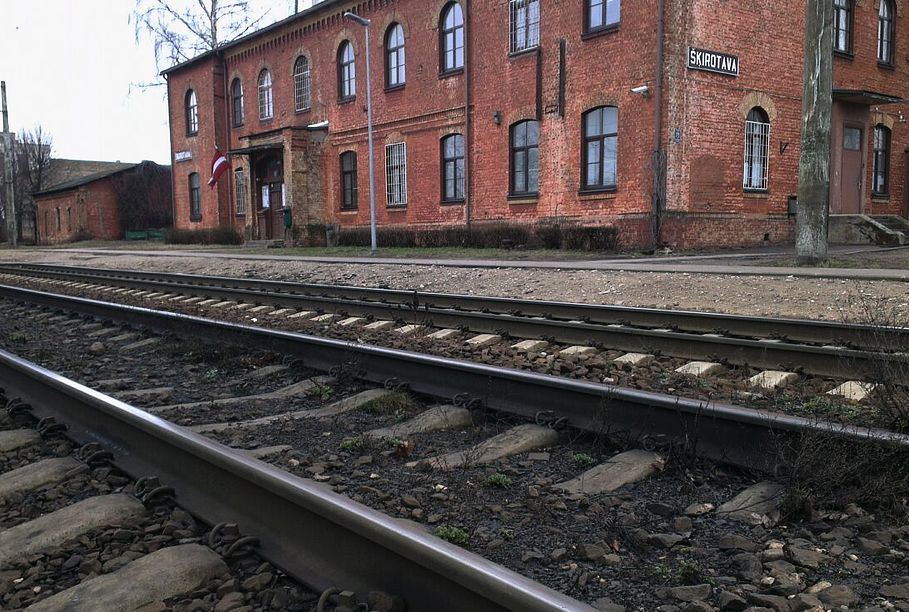His is just one of the many deportee memories appearing on LSM over the last few days.
When word got out about the looming deportations, Aivars Krieviņš was an eighteen-year-old youth.
As the authorities tried to deport him, he went into hiding. Eventually he went to Siberia - on his own accord - to look for his family.
He shared a house with his mother and younger sister at Vecsaule, in the Bauska region. His older sister had already settled down in Rīga, while his father had gone to the Kurzeme region following battles at Bauska as he had been a member of the Defenders paramilitary group.
"I think I have never had a youth... It started and ended just like that," Aivars says, looking back at the age of 86.
Pieci.lv talked to him at his daughter's home in Rīga's Ziepniekkalns, with the fridge sometimes making noises in the background. A neatly cut plum cake was on the table, surrounded by hyacinths and daffodils in little pots.
"The deportations were felt prior [to actually happening]. There were cars with armed men driving around a few days before," he said.
His worried mother sensed something is about to happen and made him spend the night of March 24 hiding in the forest. However as it was peaceful that day he went back home to sleep after a night out in the cold.
"At the Dāviņi collective farm there was a politruk [enforcer of ideology] who lived nearby. He always needed something - flour, bread... he used to just come and always try getting something. My mother said she's had enough, that this not an inn - I have nothing to give to you and I won't... and I think that's what did it," said Aivars.
In the morning after the night at the forest, three men came - the a senior official at the parish, the aforementioned politruk, and Fedya, a friend of Aivars from the war. They were all armed.
"I was told - go harness the horse. Okay. I went there, and Fedya comes with me. We look each other in the eye, and he gestures with his hands - as you wish. I wave my hand and [run] away. Yes, he allowed me to run," said Aivars, who fled to the forest wearing just a suit.
His mother, younger sister and, separately, his older sister from Rīga were deported.
He hid in the forest for a week. "Life was not too safe in the forest, and it was cold too. For the first night I had nothing at all - I broke some fir branches, lay on them and them broke some fir branches on the top, that's how I slept," he said.
When the deportations were over, Aivars went home to find that other people have moved in. Locals were looking down upon him, and he couldn't get a passport at the local authority as he had managed to escape Siberia.
In late April Aivars was caught and questioned by the police. The police discovered his father's old guns hidden at home.
Aivars was in trouble once again, and once again managed to escape. He went from one relative to another, however no one had the courage to give him shelter for more than a night. They were afraid as Aivars was on the lam. Finally he went to Rīga to live with his mother's relatives.
He did not have any contacts with his mother and little sister, however his elder sister was sending letters to Rīga. He decided to go see his sister via a passenger train to Siberia.
"My sister lived in a small hut under two hostesses, together with another girl from Latvia - Martiņa, from Sidgunda. They had spirit at the store, [but as for] bread - they sometimes brought it, baked it, handed it out and there was none left once again," he said.
After spending some time in Omsk, Aivars and his sister moved to Trusovka where their mother and younger sister found them. He worked in construction, making ovens and bricks. When Stalin died in 1953, they had an opportunity to go home.
He spent a total of seven years in Siberia, and life was not easy after returning too. He had difficulties forming documents, finding a place to live... However, returning to one's motherland was what's most important.
Having lost his youth, Aivars tried to start anew--just like the others who were lucky enough to be able to return.
Read more about one of the darkest days in the Latvia's history here.



























